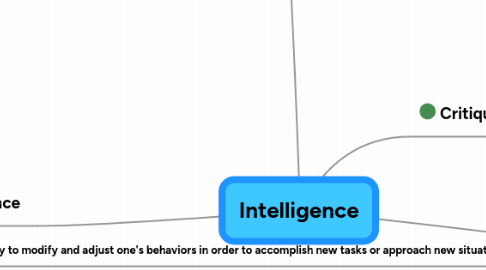
1. The ability to modify and adjust one's behaviors in order to accomplish new tasks or approach new situations successfully
2. Components
2.1. Qualitative characteristics
2.1.1. Individuals have strengths in different areas of intelligence (Gardner's theory of multiple intelligences)
2.1.2. What defines intelligent varies by culture (eg Industrialized countries v. primative societies)
2.1.3. Environment plays a critical role in intelligence
2.2. Quantitative characteristics
2.2.1. Scores well on IQ tests and general intelligence tests (in our society) - this is not the same qualification if one lives in a primative society. The standards by which one is determined to be intelligent in those types of cultures differs from industrialized Western countries.
2.2.2. Sucess in school - whatever success level is for each individual. Thus, if someone meets and exceeds their potential, they are academically successful.
2.3. Sternberg's Triarchic Theory
2.3.1. Intelligent behavior involves:
2.3.1.1. Environmental Context
2.3.1.1.1. Adapting behavior to fit the environment
2.3.1.1.2. Adapting the environment to fit one's needs
2.3.1.1.3. Selecting an environment conducive to success
2.3.1.2. Prior Experience
2.3.1.2.1. Dealing with a new situation by drawing on past experience
2.3.1.2.2. Dealing with a familiar situation quickly and efficiently
2.3.1.3. Cognitive Processes
2.3.1.3.1. Interpreting new situations in useful ways
2.3.1.3.2. Sustaining concentration on a task
2.3.1.3.3. Separating important information from irrelevant details
2.3.1.3.4. Identifying effect problem solving strategies
2.3.1.3.5. Finding relationships among seemingly different ideas
2.3.1.3.6. Making effective use of feedback
2.3.1.3.7. Appying other processes as well
3. Children and Intelligence
3.1. Children acquire intelligence by expanding their schema and prior knowledge about the world around them
3.2. This means, children should be exposed to as wide a variety of experiences as possible - keeping in mind their interest level and developmental level
3.3. The idea of improving children's intelligence should not be limited to academic success. Emotional and Social skills are just as important to becoming a healthy, contributing member of society as being able to read and complete complex math problems
3.4. Scaffolding is an important part of parenting and educating children
3.4.1. Give a man a fish and you'll feed him for a day. Teach a man to fish and you'll feed him for a lifetime.
